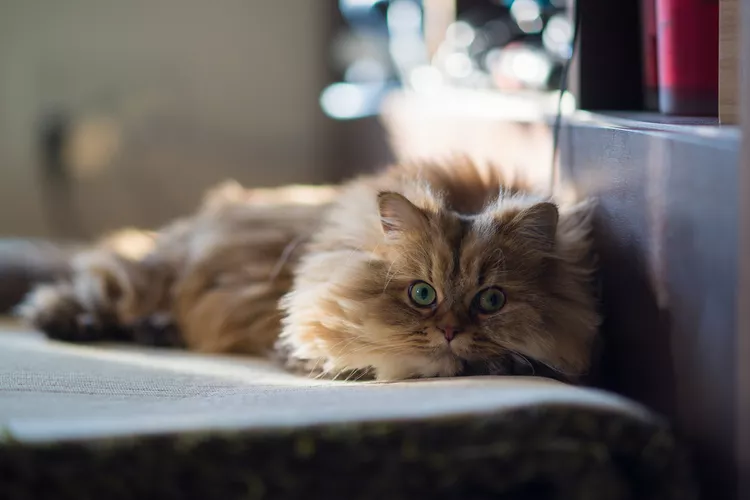Polycystic Kidney Disease in Cats

Polycystic kidney disease is an inherited, incurable disease that affects a cat's kidneys. Most commonly seen in Persian cats, polycystic kidney disease, or PKD, can cause severe discomfort in your cat and requires prompt diagnosis and palliative care. The only cause of PKD is a mutated gene that can be passed to offspring if present in either parent. A vet can best diagnose PKD using ultrasound and sometimes perform fluid analysis to determine kidney function. The only way to prevent PKD is to remove it from the gene pool. Your vet must do genetic testing on cats suspected to carry the gene, and if discovered, you must not breed the cat.
What Is Polycystic Kidney Disease?
Polycystic kidney disease, also known as PKD, is a disease that causes cysts to form on the tissue of the kidney. These liquid-filled sacs multiply over time and, if untreated, can destroy the organ and cause kidney failure. The cysts can vary in size and number and aren't identifiable until later in a cat's life. A cat with PKD is born with cysts, although very small. Still, PKD can be diagnosed as early as six months by examining the cysts.
Symptoms of Polycystic Kidney Disease in Cats
PKD symptoms in cats are similar to those of any feline kidney disease. If you suspect something wrong with your cat's kidney, visit your vet right away.
There are a variety of uncomfortable symptoms that may indicate PKD in your cat. All PKD symptoms point to poor kidney function. Increased thirst and urination are telltale signs of a kidney problem and should be addressed immediately. Other symptoms such as vomiting and lethargy are less obvious signifiers of reduced or failed kidney function, so visit your vet for a definitive diagnosis. Most PKD symptoms are recognized in cats over seven years of age.
What Causes Polycystic Kidney Disease in Cats?
Polycystic kidney disease is caused by an inherited, dominant, mutated gene. It is unknown what causes the development of this gene.
Genetics
Polycystic kidney disease is a hereditary disease. If one or both of a cat's parents carry the PKD gene, it will be passed to its offspring. Even in minor or asymptomatic cases of PKD, a cat with the gene will still pass it along.
Breed Type
Some breeds are more predisposed to carrying PKD than others. PKD occurs most commonly in Persian cats, affecting 38% in the United States. Himalayans and British shorthairs are also commonly affected by PKD.
How Do Vets Diagnose Polycystic Kidney Disease in Cats?
The best way to definitively diagnose polycystic kidney disease in a cat is through imaging diagnostics—most commonly an ultrasound. An ultrasound is the fastest, safest, and least invasive way to diagnose PKD, but an x-ray may be necessary to check overall kidney function in more advanced cases. Your vet may also perform blood and fluid analysis and genetic testing. Genetic testing only indicates the presence of the gene and does reveal the severity or progression of the disease.
Treatment & Prevention
There is no cure for polycystic kidney disease, but there are treatments available to manage symptoms and keep the kidney functioning for as long as possible. The treatment of PKD is similar to that of any kidney disease in a cat. Your cat may be prescribed antibiotics, anti-inflammatories, pain medications, appetite stimulants, fluid therapy, and a specialized diet. Your vet may also drain the cysts, but this only acts as temporary relief, and typically, there are too many cysts to drain.
The only way to prevent polycystic kidney disease is to ensure that cats with the PKD gene are not bred. Screening Persians and other high-risk breeds for the presence of PKD1 must be done prior to breeding, and any cats that test positive for the gene must not be bred.
Prognosis for Cats with Polycystic Kidney Disease
Symptoms can usually be managed effectively until chronic renal failure occurs, at which point your cat will become terminal. Secondary infections, such as sepsis, may also lead to death.
-
How do I know if my Persian kitten has polycystic kidney disease?
The best way to diagnose PKD in kittens, before symptoms occur, is with genetic testing and an ultrasound. Even though cats usually won't display PKD symptoms until around seven years old, they are born with cysts if they have the disease.
-
Is PKD treatable?
PKD can be managed with palliative care but it cannot be cured. Your vet can prescribe medications to reduce pain and discomfort, but the disease will eventually become terminal.
-
What causes PKD?
Doctors don't know what causes the gene mutation that creates PKD, but they know that it's hereditary. If a cat has the PKD gene, it must not be bred.